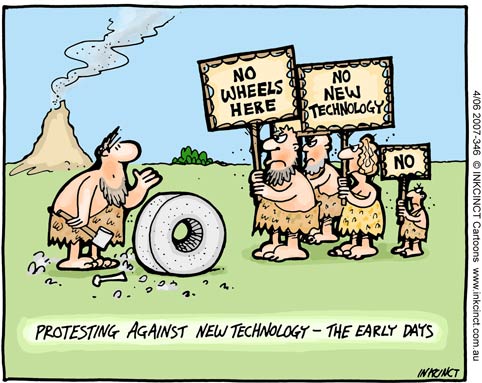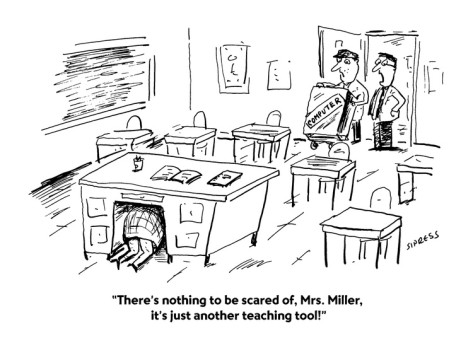Model Mayhem – Tech Integration Series

We can look amongst our colleagues and, like most aspects of education, we see people at various ends of the spectrum. This discrepancy can be attributed to any number of factors: age, education background, personal interests, comfort level, work experience, and the list can go on and on. Regardless of where they are on the continuum we can usually group educators into two very general categories: those who are asking “Where do I start?” and those who are asking “How can I do it better?“
 |
| Protesting Against Technology – The Early Days. (2011). Uploaded to Tech Integration by Mary Fish. Available online at: http://www.coetail.com/marypkfish/2011/12/15/technology-integration-what-does-it-really-mean/ |
In either position, educators need to ensure that they don’t fall into the trap of incorporating technology into their lessons blindly. Whatever we do with our students it is our professional responsibility to ensure that our actions are driven by purpose and backed by strong pedagogical theory. This can feel like added pressure for some educators because while we feel confident in our content area it can be more difficult to feel confident when it comes to technology; especially when things are changing so quickly!
 |
| Teacher Tech Cartoon. (2014). Uploaded by Joanne Jacobs. Available online at: http://www.joannejacobs.com/2014/03/teachers-get-tech-but-not-training/ |
It can be easy to become fixated on specific tech tools (SMART Boards, iPads, Chromebooks, etc); especially if the school or division has invested a lot of money in that area. An educator’s responsibility is to focus on the skills and values the students need to use various types of tech tools to meet and extend their understanding of curricular objectives and deepen their overall comprehension.
Over the next month I will be releasing a Tech Integration Series where in which I will examine four different models of tech integration within the education setting:
– TPACK
– SAMR
– Levels of Teaching Innovation (LOTI)
– Technology Integration Matrix (TIM)
I will review each model by providing a general summary of the model, what it might look like in a classroom setting and attempt to critique the pedagogical theory and foundations behind the model’s development.
It is my hopes that by the end of this series we are left with a resource to assist educators in making informed decisions that are backed by strong professional theory.